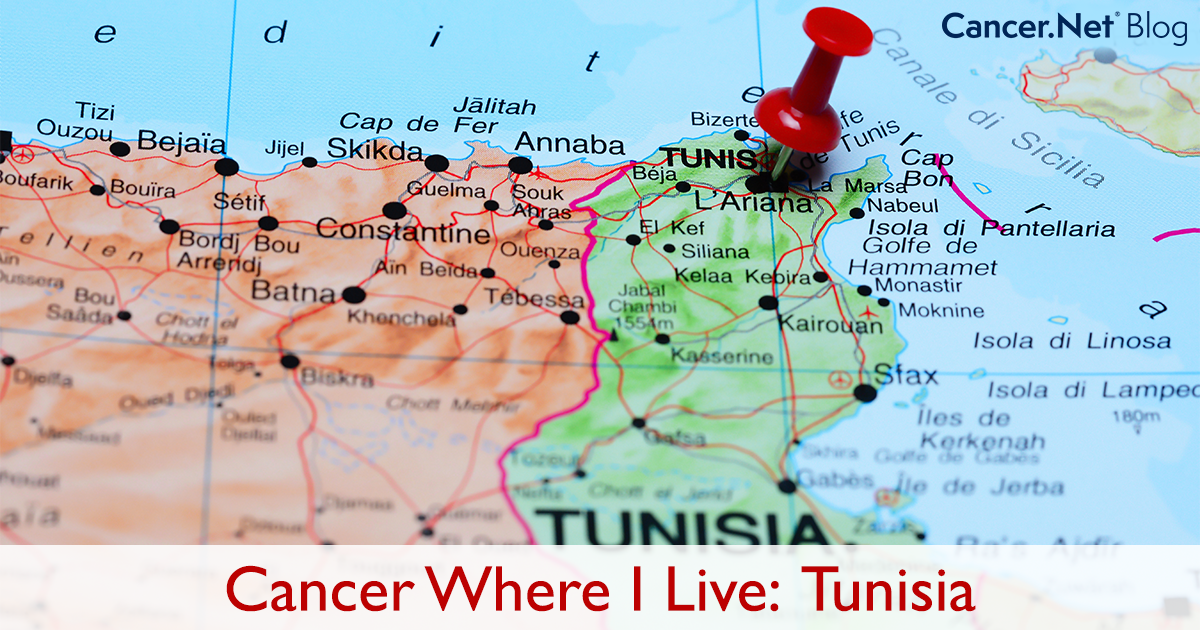
Cancer in My Community is a Cancer.Net Blog series that shows the global impact of cancer and how people work to care for those with cancer in their region. Ichrak Ben Abdallah, MD, is an early-career medical oncologist from Tunisia. She received most of her training in university hospitals in Tunis, the capital of Tunisia, and she graduated from the Faculty of Medicine of Tunis. Her main research area is cancer survivorship. She was a recipient of the ASCO International Development and Education Award in 2022.
Why I care for people with cancer
What I find appealing about medical oncology is the impressively growing treatment landscape, particularly with the fascinating advancements in cancer research during the last decade. This has motivated me to want to be part of this great shift and to be of help to the oncology community. Besides, the satisfaction that I feel when I am able to relieve someone else’s pain is unparalleled. It is such a privilege to be alongside people during the most difficult times of their lives and to work hard at finding solutions for them.
What is also special about oncology is its multidisciplinary nature. It brings different medical specialties together, which allows each practitioner to contribute to improving a patient’s quality of life based on their own perspective, experience, and skills. I think that oncology is the best illustration of collaboration and teamwork in medicine.
Because few medical students learn about oncology during their undergraduate programs, I encourage them to get exposure to oncology during their clinical rotations in medical school. Many students don’t realize what oncology is about and what members of the cancer care team do in their daily practice. Students often ask if working in oncology makes me feel depressed. I genuinely reply, “Actually, this specialty is full of hope.”
What cancer is like in Tunisia
Tunisia is a small country that lies at the northernmost point of Africa. The population is about 12 million people, and it is classified by the World Bank as a lower middle-income country. The adult literacy rate in Tunisia is 79%. There are currently about 120 medical oncologists in the whole country of Tunisia. More than 70% of them are women, and 53% are working in public hospitals.
Cancer incidence is on a constant rise in Tunisia, with 19,446 cases being diagnosed in 2020, according to the World Health Organization (WHO). The 5 most commonly diagnosed cancers in Tunisia are breast cancer (15.9% of cases), lung cancer (15.1%), colorectal cancer (9.6%), bladder cancer (7.2%), and prostate cancer (6.1%). The top 3 leading causes of cancer death are lung cancer (22.2%), breast cancer (8.3%), and bladder cancer (6.9%). In female patients, breast cancer remains the leading cause of death, with an increased incidence of inflammatory breast cancer compared to Western, Asian, and American populations. For male patients, the leading cause of cancer death is lung cancer, which is diagnosed at an advanced stage in more than 60% to 70% of cases in our country.
What I appreciate the most about cancer care in Tunisia is that more than 95% of Tunisian citizens have free access to treatments, including chemotherapy, some targeted therapies, radiation therapy in public hospitals, and cancer surgery. Workers in Tunisia have their treatment covered by the National Health Insurance Fund, and unemployed patients or patients with fewer financial resources have their treatment costs fully covered by the Ministry of Health. However, this has put greater cost on the Tunisian government, and health care providers cannot afford the newest treatments for our patients. For example, in the treatment landscape of breast cancer, there is only 1 targeted therapy available for people with HER2-positive breast cancer in Tunisia, despite many other treatments being available elsewhere in the world. This reflects the frustration that oncologists in my country experience when they are not able to provide modern treatments to our patients who could potentially be cured if they were treated in other parts of the world.
Addressing tobacco use in Tunisia
More than 90% of lung cancers in Tunisia are attributed to smoking. In fact, according to a paper published by WHO, Tunisia has the second highest prevalence of tobacco use among Arab countries after Lebanon, and the second highest prevalence of tobacco use in Africa after Lesotho. Between 20% and 30% of the population smokes, with a higher prevalence of usage among men.
The Tunisian government has deployed efforts to reduce tobacco use by prohibiting advertising for tobacco products in the media and newspapers, increasing taxes applied to cigarettes, making nicotine therapy replacement available (although not reimbursed), and setting up public services supporting quitting tobacco use. However, I believe more restrictive measures should be applied to decrease tobacco consumption, especially in public areas.
Where people with cancer can find local resources and support
The Tunisian Society of Medical Oncology (La Société Tunisienne d’Oncologie Médicale, or STOM) was founded in 2010 and has been making great efforts to raise awareness among people with cancer. It provides clear and understandable cancer information that is available for free online. The information is written in Tunisian dialect, with Arabic and French translations also available.
The STOM website includes guidance on chemotherapy side effects and how to deal with them, nutrition recommendations, sexual health preservation tips during cancer, and facts on COVID-19 in people with cancer. An Android app was also created in 2019 called “STOM Guidelines” that people can download for free. The STOM holds its national meeting every 2 years, and guidelines and recommendations for oncologists and patients are updated accordingly. Printed pamphlets and visual aids are also available and distributed to patients during their first visit to the cancer care team.
The author has no relationships relevant to this content to disclose.




